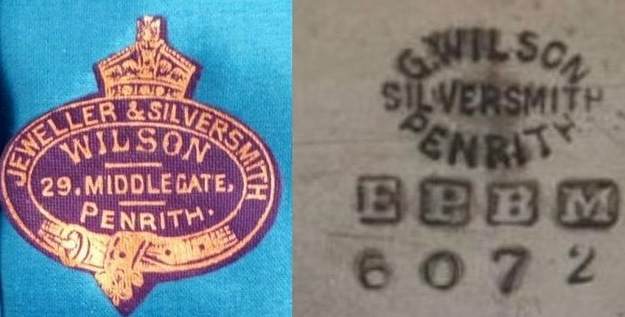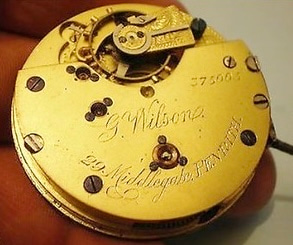

The workshop known as Wilson in Penrith (County of Cumbria, historically Cumberland, in the northwest of England) was founded in the mid-19th century by watchmaker and jeweler George Wilson. Initially, George Wilson worked in the town of Appleby-in-Westmorland, approximately 15 miles east of Penrith, but around 1850 he relocated his business to Penrith.
In the mid-19th century, Penrith experienced significant economic growth, a key factor being the opening of the Lancaster–Carlisle Railway in 1846, followed by the Eden Valley Railway (1862) and the Cockermouth–Keswick–Penrith line (1865). The improved transport infrastructure likely facilitated better access to suppliers, easier movement of goods, and potentially contributed to population growth and the town’s prosperity. This, in turn, could have provided a broader and more affluent customer base for luxury goods such as watches and jewelry.
Trade directories list Wilson as a watchmaker and jeweler active in Penrith between 1869 and 1879, confirming his business activity in the late Victorian period. At that time, the name of the retailer was typically printed on watch and instrument dials, so the inscription “Wilson, Penrith” indicates that the instruments (watches, barometers, etc.) were sold through Wilson’s shop in Penrith, even though the mechanisms themselves may have been produced by large manufacturers of the era.
George Wilson was known for selling high-quality chronometers, including 18-carat gold “half-hunter” pocket watches. Inside a pair-case silver pocket watch, hallmarked Birmingham 1861, with a movement signed “George Wilson, Appleby,” there was a repair receipt from “Geo. Wilson, Penrith,” bearing serial number 2460. This suggests that he either continued to sign movements with his former Appleby location after moving to Penrith, or sold watches originally acquired during his Appleby period.
After George Wilson’s death, the business was carried on by his descendants. According to local press reports, G. Wilson (Penrith) was passed down through several generations. The founder’s son, Hubert Wilson, headed the workshop until his death in 1921. The business then passed to his grandson, Harrison Proctor Wilson, and from 1949 to the founder’s great-grandson, Dudley Wilson. The Wilson shop was located on Middlegate, one of Penrith’s main streets; records show the move to 29 Middlegate occurred around 1870. The family enterprise operated for over a century: the last in the line, Dudley Wilson, retired in the 1970s, after which the Wilson jewelry and watch shop in Penrith ceased trading. The firm thus spanned several eras—from the Victorian period to the mid-20th century—while maintaining the continuity of a family craft.
Wilson, Penrith was known, in addition to watches and jewelry, for selling barometers—both mercury wheel barometers and the then-new aneroid barometers of the 19th century. Many Victorian barometers of this period featured elaborate decoration, and surviving examples confirm their high quality and variety of design styles.
Barometers marked Wilson, Penrith appear in museums and private collections alongside other scientific instruments of the 19th and 20th centuries. Auction catalogues in Penrith and across Britain regularly list watches, pocket chronometers, and barometers from this maker. For example, a gold pocket watch by George Wilson, with a numbered movement and Penrith hallmark, dated 1873, sold at auction for £1,300. That same auction catalogue included a historical note on the company, confirming its founding year (1850) and Wilson’s specialization as a jeweler and watchmaker.
Historical records also indicate the broad profile of the business: in addition to watches and barometers, Wilson acted as a local silversmith and optical goods dealer. Archival items include, for example, silver spoons engraved “Wilson Penrith” (1902)—likely souvenir pieces from Hubert Wilson’s tenure. The family workshop was cited in regional newspapers as one of Penrith’s oldest trading establishments, operating for more than a century.
In summary, Wilson (Penrith) was first and foremost a family-run watchmaking and jewelry firm that contributed to the history of instrument-making in the late 19th and early 20th centuries in northern England. During the Victorian and Edwardian eras, it produced (or commissioned under its own name) high-quality aneroid barometers of distinctive design, combining functionality with decorative appeal. Confirmed mentions in trade directories, auction catalogues, and museum collections attest to the fact that instruments bearing the “Wilson. Penrith.” signature—whether wall barometers, watches, or other measuring devices—were in demand at the time and today remain valued collectible items tied to the heritage of Victorian craftsmanship in Britain.